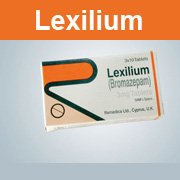
Lexilium – Indications & Usage
Each Lexilium tablet contains 3mg Bromazepam, and is used for the short-term, symptomatic relief of manifestations of excessive anxiety in patients with anxiety neurosis. Lexilium is only indicated when the disorder is severe, disabling or subjecting the individual extreme stress;
Emotional Disturbances
Acute tension and anxiety states, difficulties in interpersonal contacts, agitation, insomnia and agitated depressive reactions.
Functional Disturbances
- Cardiovascular & Respiratory Systems
Pseudo-Angina Pectoris, Precordial Anxiety, Emotiogenic Hypertension, Tachycardia, Dyspnea, hyperventilation. - Gastrointestinal System
Irritable Bowel Syndrome, Epigastric Pain, Spasm, Bloating, Diarrhea etc. - Genitourinary System
Frequency, Irritable Bladder and Dysmenorrhea - Psychosis Disorders
Psychogenic Headache, Psychogenic Dermatosis, Asthma, Gastric and Duodenal Ulcer, Ulcerative colitis, Emotional Reactions to chronic organic disease and adjuvant to psychotherapy in psychoneurosis.
Lexilum – Recommended Dosage
The average dose for ambulant therapy is 1.5 mg or 3 mg three times a day. in severe cases (especially when the patient is hospitalized), the dose of Lexilium can be increased to 6 mg to 12 mg for up to three times a day.
Please NOTE: These are just average recommendations and the dosage of Lexilium should be individually determined.
Treatment of ambulant patients in general begins with the lowest dose, gradually increasing if necessary to the optimum level. After about 8 to12 weeks, according to progress in therapy, dosage can usually be reduced gradually and then stopped.
When to Avoid Lexilium? – Contraindications
Lexilium tablets should not be taken if you are hypersensitive to Benzodiazepines or have myasthenia gravis, severe hepatic insufficiency, severe respiratory insufficiency or sleep apnea syndrome.
Using Lexilium in Elderly Patients
Elderly and debilitated patients or those with organic brain syndrome, have been found to be prone to CNS depression after even low doses of Lexilium. Therefore, this drug should be initiated in these patients with very low initial doses and increments should be made gradually.
Lexilium – Impaired Hepatic or Renal Function
In patients with impaired hepatic or renal function, it is recommended to initiate therapy, if necessary, at a very low dose and to increase the dosage only to the extent that such an increase is compatible with the degree of residual function of these organs. Such patients should be followed closely & have periodic laboratory assessment.
Lexilium – Drug Warnings
Lexilium is not recommended for use in patients with depressive disorders or psychosis. Patients should be advised against the concurrent use of alcohol and other CNS depressant drugs. Patients with known or presumed dependence from alcohol or drugs should not take Lexilium or other benzodiazepines, except in rare situations under medical supervision.
Hello.
I am a women age 38 and I am trying to get pregnant through IVF and recently I have taken around 25 tablets of lexilium because i had some problems and I was not able to restrain myself because I had a problem with my husband.
my question is, will it have a bad effect on my embryos since I intend to start a process of getting eggs for embryo on two weeks.
I am ashamed of telling my doctor about this, please if anyone can help me on this I would appreciate very much.
thank you very much in advance.